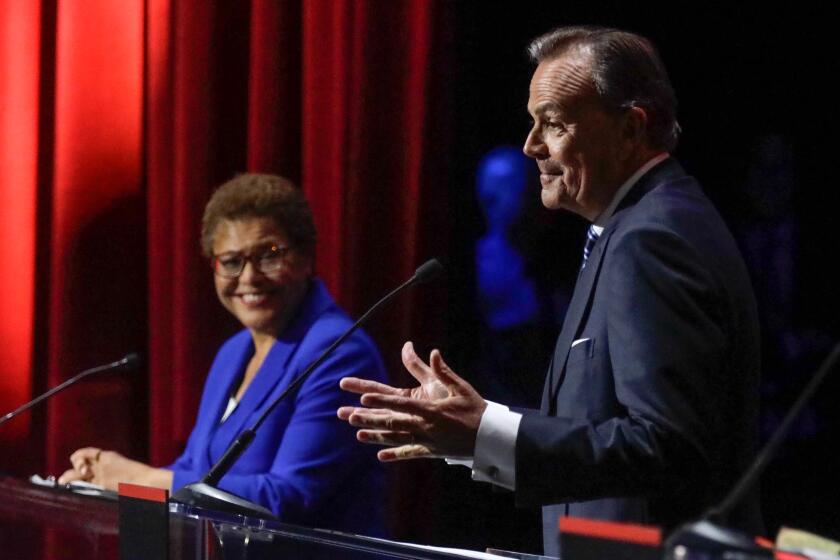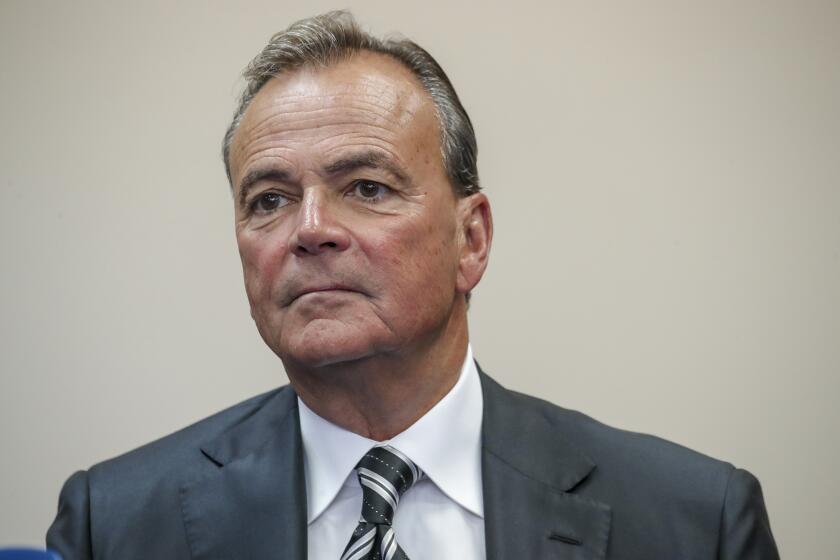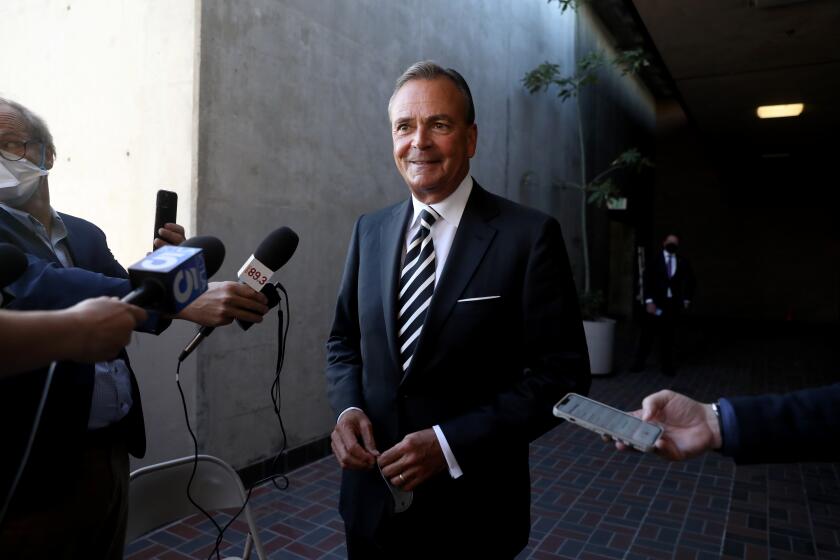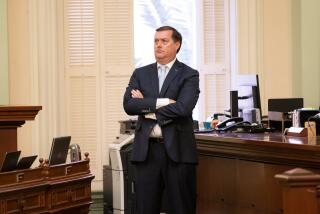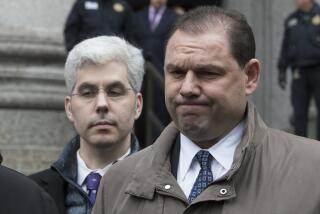If Rick Caruso wants to buy L.A.’s mayoral election, that’s OK with the Supreme Court
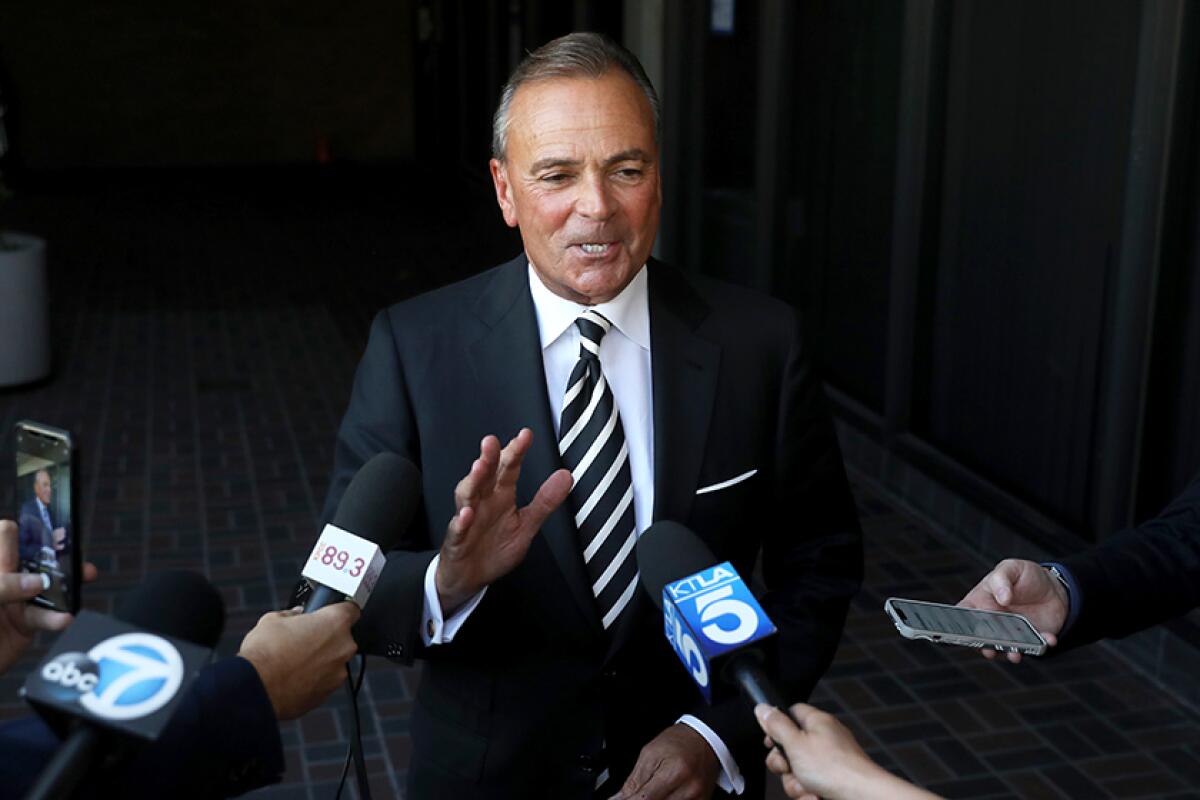
- Share via
I’m so sick of Rick Caruso.
Every time I turn on the TV or glance at social media, I find him staring out at me. I never “liked” him or retweeted him or clicked to buy one of his tote bags. So why is he hounding me?
But there he is, the mall-developer-turned-mayoral candidate, bombarding me — and the rest of Los Angeles, presumably — with one slick ad after another, dispensing the usual bromides about cleaning up crime, homelessness and corruption until we’re all hearing his promises in our sleep.
That’s what you can do when you have a fortune estimated at $4.3 billion: Waltz into the campaign at the last minute and beat your message into the heads of voters who didn’t ask to hear it, in the long tradition of mega-rich candidates like Meg Whitman, Carly Fiorina, Mike Bloomberg, Jon Corzine, Donald Trump and Tom Steyer.
Some people don’t believe that sort of thing works. But it’s often remarkably effective.
Opinion Columnist
Nicholas Goldberg
Nicholas Goldberg served 11 years as editor of the editorial page and is a former editor of the Op-Ed page and Sunday Opinion section.
Caruso had the support of 8% of the electorate in February, polls showed. Then he spent about $10 million on digital and television advertising and lo and behold, as of last week, he has 24% support, putting him neck and neck with the other leading candidate in the June primary, Rep. Karen Bass.
For each vote that moved his way, Caruso spent about $153 by my back-of-the-envelope calculation, assuming the polls are right and turnout is about the same as last time.
It’s not fair. It’s not democratic. Big money distorts the race and gives special, unmerited advantages to wealthy candidates.
But that’s our system.
Caruso is allowed to spend as much of his own enormous fortune as he chooses on his campaign. All $4.3 billion, if he wants. That’s been the law for nearly half a century since the Supreme Court decided a case called Buckley vs. Valeo in 1976.
A starkly contrasting pair are on track for a November runoff that would feature sharp divides by ideology, geography and race.
That decision — which in effect declared that rich people have a constitutional right to buy their way into public office — is less well known than the Supreme Court’s 2010 decision in Citizens United, but it is in many ways the court’s “original sin” on campaign finance.
It dates back to the era just after the Watergate scandal. Congress was trying to clean up campaign finance corruption that had helped bring down President Nixon.
But the law Congress passed didn’t meet with the approval of the court, which struck down key sections. The justices held that while it was legal to limit what donors may contribute to a campaign, because that can pose a real danger of corruption, it is unconstitutional to limit what candidates may spend.
Any spending restriction at all would constitute an infringement on the candidate’s freedom of speech, the court decided, because it would restrain the “quantity” of speech the candidate could engage in.
With Buckley vs. Valeo, the court opened the floodgates to unlimited independent expenditures and at the same time sent a clear message to super-wealthy people that they could buy their way to electoral victory.
While other big-name candidates have not yet begun airing television commercials, developer Rick Caruso has used his wealth to blanket the airwaves.
The decision made the United States an outlier. We’re the only advanced democracy — unlike, say, Canada or most Western European countries — that allows unlimited campaign spending, says Daniel Weiner, co-director of the election and government program at the Brennan Center for Justice. Many of those countries have robust public financing systems in which taxpayer dollars cover campaign costs.
“The Buckley decision took a set of 1st Amendment doctrines which had been used to protect dissenters and the least powerful and harnessed them instead to guarantee a megaphone for the most powerful interests,” says Weiner.
Buckley creates an uneven playing field. It tends to benefit rich white elites. It helps incumbents. It drives up the cost of elections.
In 2020, the total cost of federal elections was close to $14 billion, according to the Center for Responsive Politics — more than twice as much as the 2016 cycle. According to fivethirtyeight.com, more than 90% of candidates who outspend their opponents win their races.
The Times has been looking into some of Rick Caruso’s campaign trail claims and his record. Here’s what you should know.
Ellen Weintraub, a member of the Federal Election Commission, argues that Buckley gets the argument backward. Failing to limit spending, she says, is what really restricts speech — because all that money being spent drowns out lesser-financed candidates, denying voters the chance to hear and weigh all arguments.
Buckley also forces less-wealthy candidates to raise even more money from special interest donors if they hope to compete.
I have no beef with Rick Caruso. I have no reason to doubt that he is well-meaning, intelligent and competent.
But I find it offensive that he can bypass L.A.’s public financing system and radically outspend his opponents, many of whom have been campaigning diligently for months.
I confess to taking a certain satisfaction when voters send wealthy candidates like Caruso packing, as California voters did to Fiorina, Whitman and Al Checchi.
Developer Rick Caruso joined the mayor’s race in February and has already loaned his campaign $10 million. Can he buy his way to City Hall?
As for the Buckley decision, it is unlikely to be overturned any time soon. But let’s keep hoping.
As Canada and other countries have shown, there are ways to write campaign finance laws that allow for a fair and level playing field without damaging free speech rights. That’s because money isn’t speech, and limiting candidates’ spending in order to protect election integrity won’t stop debates, speeches, tweets, rallies or the airing of a reasonable number of ads.
In 1985, Justice Byron White wrote in a dissent: “The 1st Amendment protects the right to speak, not to spend.” In 2006, Justice John Paul Stevens wrote: “I am convinced that Buckley’s holding on expenditure limits is wrong, and that the time has come to overrule it.”
The Buckley decision was wrong when it was written — and is still wrong today. Perhaps the full court will eventually realize that.
More to Read
A cure for the common opinion
Get thought-provoking perspectives with our weekly newsletter.
You may occasionally receive promotional content from the Los Angeles Times.

